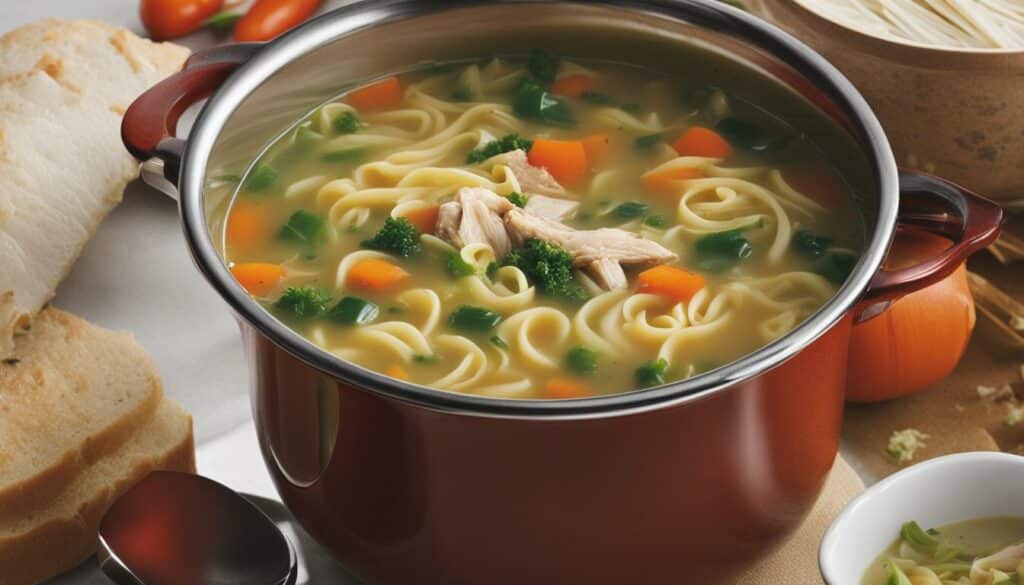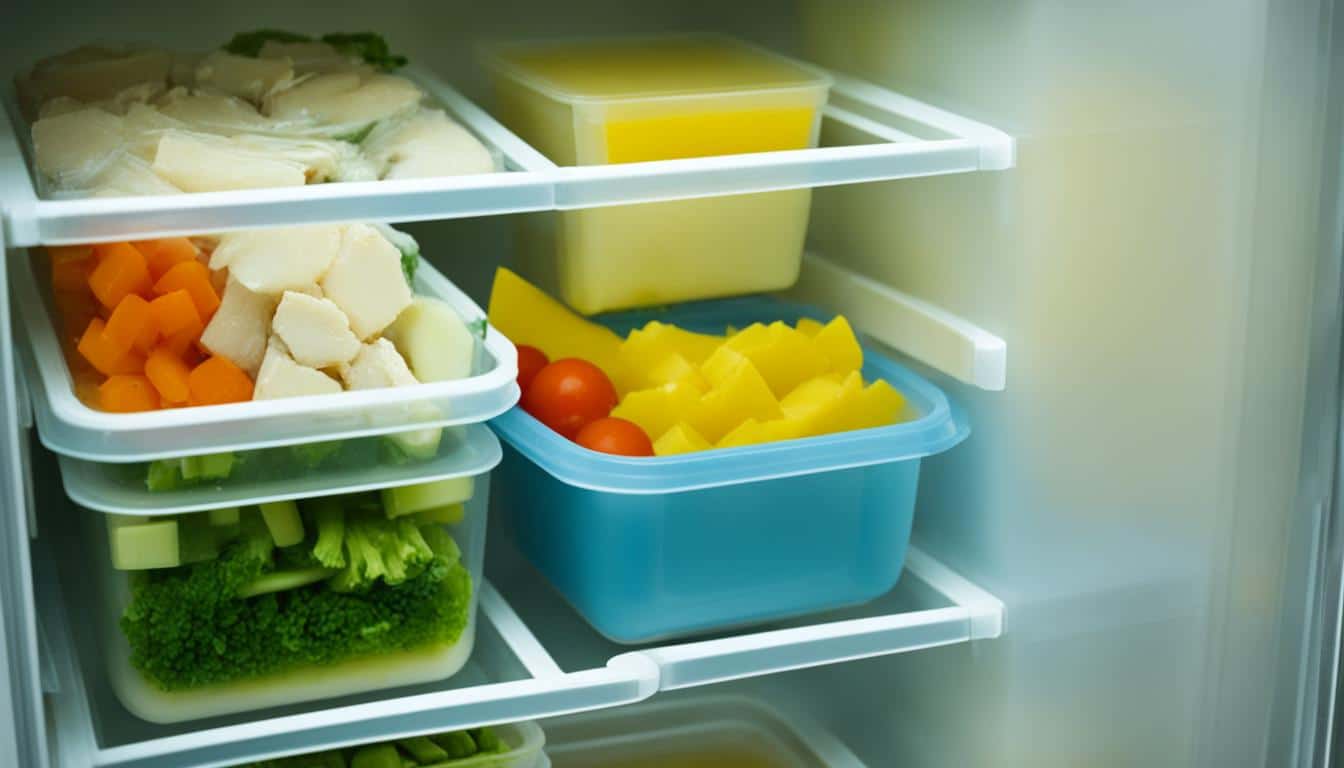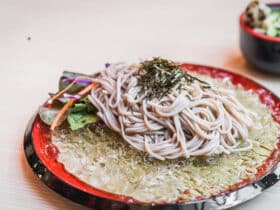Welcome to our guide on keeping your chicken soup fresh and delicious for as long as possible in the refrigerator! Storing chicken soup properly is essential for maintaining its taste, quality, and safety. By understanding the factors that affect its shelf life and following some simple storage guidelines, you can ensure that your homemade or store-bought chicken soup stays fresh and ready to enjoy.
Key Takeaways:
- Properly storing chicken soup in the fridge helps maintain its freshness and safety.
- Transfer the soup to an airtight container and label it with the date of cooking to prevent bacterial growth and maintain its quality.
- The shelf life of chicken soup can be influenced by factors such as ingredient quality, storage method, and temperature.
- Homemade chicken noodle soup typically lasts 3-5 days in the refrigerator, while canned soups can last up to a week.
- Spoilage signs include a foul odor, mold growth, and unusual texture, and spoiled soup should be discarded.
Importance of Properly Storing Chicken Noodle Soup
Properly storing chicken soup is crucial to maintain its freshness and prevent the growth of harmful bacteria. By following safe storage practices, you can ensure that your soup stays delicious and safe to consume.
Preventing Bacterial Growth: Bacterial growth in soup can lead to foodborne illnesses and spoilage. Storing soup in the refrigerator at a temperature below 40°F/4°C slows down bacterial growth and extends its shelf life.
Use Airtight Containers: Transferring your chicken soup to airtight containers is essential. These containers provide a barrier against odor absorption and help retain the soup’s freshness. Airtight containers also prevent cross-contamination with other foods in the refrigerator.
Labeling Soup Containers: To keep track of the soup’s freshness, it’s important to label the containers with the date of cooking. This labeling practice ensures that you consume the soup within a safe timeframe and avoids confusion with other stored items.
To illustrate the importance of proper chicken soup storage, consider the following table:
| Consequence | Improper Storage | Proper Storage |
|---|---|---|
| Bacterial Growth | Increased risk of foodborne illnesses | Reduced risk of foodborne illnesses |
| Taste and Freshness | Soup can become rancid or develop off-flavors | Soup retains its taste and freshness for longer |
| Food Waste | Greater likelihood of spoilage and wastage | Minimized food waste through proper storage |
By understanding the importance of chicken soup storage and implementing proper storage practices, you can enjoy safe and delicious soup for an extended period.
Factors Affecting the Shelf Life of Chicken Noodle Soup
When it comes to preserving the freshness and quality of your chicken noodle soup, several factors come into play. By understanding these factors, you can ensure that your soup stays delicious and safe to consume for as long as possible. Let’s explore the key elements that affect the shelf life of chicken noodle soup.
Quality Ingredients for Longevity
The quality of ingredients used in your chicken noodle soup plays a significant role in determining its shelf life. Using fresh, high-quality ingredients ensures a longer lifespan for your soup. Fresh vegetables, such as carrots and celery, not only add flavor but also contribute to the overall nutritional value of the soup. When it comes to chicken, opt for fresh, lean cuts rather than frozen or processed options.
Storage Methods for Extended Freshness
Proper storage is crucial for maintaining the freshness of your chicken noodle soup. One of the most effective methods is storing the soup in an airtight container. This prevents exposure to air, which can lead to oxidation and spoilage. Additionally, storing the soup in the refrigerator at a temperature below 40°F/4°C slows down bacterial growth, extending its freshness.
Prompt Refrigeration for Optimal Freshness
After cooking or purchasing chicken noodle soup, it’s essential to refrigerate it promptly to preserve its freshness. Leaving the soup at room temperature for an extended period allows bacteria to multiply rapidly, increasing the risk of foodborne illnesses. Once the soup has cooled slightly, transfer it to an airtight container and place it in the refrigerator as soon as possible.

Taking these factors into consideration will help you in prolonging the shelf life of your chicken noodle soup. By using high-quality ingredients, employing proper storage methods, and refrigerating promptly, you can enjoy delicious and safe chicken noodle soup for a longer period.
How Long Can Chicken Noodle Soup Last in the Refrigerator?
When it comes to the shelf life of chicken noodle soup in the refrigerator, there are a few key factors to consider. Generally, homemade chicken noodle soup can last for around three to five days when stored properly in the fridge. On the other hand, canned chicken noodle soups tend to have a longer shelf life, typically lasting up to a week.
It’s important to note, however, that these timeframes are just general guidelines and may vary depending on various factors such as the freshness of the ingredients used and the storage conditions. To ensure you’re consuming safe and fresh chicken noodle soup, it’s crucial to evaluate its freshness using sensory cues like appearance, smell, and taste.
If the chicken noodle soup shows any signs of spoilage, such as an off smell, peculiar texture, or unusual appearance, it’s best to err on the side of caution and discard it to prevent foodborne illnesses.
Here’s a helpful table summarizing the estimated refrigerator shelf life of chicken noodle soup:
| Type of Soup | Refrigerator Shelf Life |
|---|---|
| Homemade Chicken Noodle Soup | 3-5 days |
| Canned Chicken Noodle Soup | Up to 1 week |
Evaluating the freshness of chicken noodle soup will help ensure that you enjoy a delicious and safe meal. Remember to trust your senses and prioritize food safety when determining whether to consume or discard the soup.
Proper Soup Storage Tips
- Transfer homemade chicken noodle soup to an airtight container before refrigerating to preserve its freshness.
- Label the container with the date of cooking to easily track its shelf life.
- Store the soup in the coldest part of the refrigerator, ideally below 40°F (4°C), to slow down bacterial growth.
- Promptly refrigerate soup after cooking or purchasing it to prevent the multiplication of harmful bacteria.
Signs of Spoiled Chicken Noodle Soup
It’s crucial to be able to identify signs of spoilage in chicken noodle soup in order to ensure food safety. Here are some key indicators that your soup may be spoiled:
- Foul odor: If your chicken noodle soup gives off an unpleasant smell, such as a sour or rancid odor, it is a clear sign of spoilage. Trust your nose and discard the soup if it smells off.
- Mold growth: Visual inspection is important when checking for spoilage. If you notice any mold growth on the surface of the soup or inside the container, it’s a strong indication that the soup has spoiled and should not be consumed.
- Unusual texture: Pay attention to the texture of your chicken noodle soup. If it appears slimy, gelled, or has a strange consistency that is different from when it was freshly prepared, it may have undergone spoilage.
By being aware of these signs, you can ensure that you don’t consume spoiled chicken noodle soup, minimizing the risk of foodborne illnesses.

Comparison of Indicators of Soup Spoilage
| Indicator | Possible Causes |
|---|---|
| Foul odor | Microbial growth or spoilage |
| Mold growth | Presence of airborne molds or contamination |
| Unusual texture | Bacterial or fungal activity |
Tips for Extending the Life of Chicken Noodle Soup
When it comes to homemade chicken noodle soup, maximizing freshness and extending its shelf life are essential. By following a few simple tips, you can enjoy delicious soup for an extended period. Here are some key measures to consider:
Firstly, it’s crucial to properly cool the soup before storing it in the refrigerator. Allowing it to cool to room temperature for about an hour, and then transferring it to airtight containers, can help prevent bacterial growth and maintain its freshness.
Dividing the soup into smaller portions is also beneficial. This not only helps with portion control but also allows you to reheat only what you need, reducing waste and preserving the flavor.
Furthermore, avoid cross-contamination by storing the soup separately from other raw meats or ingredients. This prevents the transfer of any harmful bacteria and ensures the soup remains safe for consumption.
To extend the life of your chicken noodle soup further, consider freezing any excess portions. Freezing preserves the soup’s freshness for months, allowing you to enjoy a warm bowl even on days when you’re short on time or ingredients.
Implementing these tips, including proper cooling, portion control, and freezing, can help you maximize the shelf life of your homemade chicken noodle soup. By doing so, you can savor its delicious flavors for an extended period while ensuring its safety and freshness.
https://beplantwise.org/chicken-soup-recipe-easy/
FAQ
How long can chicken soup last in the fridge?
Generally, homemade chicken soup can last in the refrigerator for three to five days, while canned soups may have a longer shelf life of up to a week.
What is the importance of properly storing chicken noodle soup?
Properly storing chicken soup in the fridge is crucial for maintaining its freshness and preventing the growth of harmful bacteria.
What factors affect the shelf life of chicken noodle soup?
Factors that can affect the shelf life of chicken soup include the quality of ingredients, storage methods, and temperature.
How can I tell if my chicken noodle soup is spoiled?
Signs of spoiled chicken noodle soup include a foul odor, mold growth, and unusual texture.
How can I extend the life of my chicken noodle soup?
To extend the life of your chicken noodle soup, you can properly cool it before storing, divide it into smaller portions, and follow proper reheating techniques. Freezing any excess soup can also allow for long-term storage.









